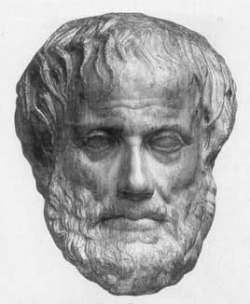Aristotle
384-322 BC
Background of Aristotle:
Aristotle was an ancient Greek philosopher. He was born in Northern Greece, and in 367, his father sent to Aristotle to Athens to study philosophy at an academy by Plato. By 347, Plato had died, yet because Aristotle did not become head of the academy, he left Athens and headed back to Macedonia. There he began tutoring Alexander the Great on philosophy. Soon after, Alexander conquered Athens, and Aristotle was able to go back to Athens to set up his own school of philosophy, which he called the Lyceum. Once Alexander the Great died, however, the Athenians began to rebel against all the Macedonians. Aristotle fled the region and went to Euboea where he stayed until his death in 322 b.c.
Why Aristotle is important:
Aristotle had a theory of speaking. He was the first person to believe that public communication happened in a linear form, and that the audience actually mattered in a speech. Aristotle came to a conclusion that there were three elements involved in communicating. These elements were the ethos, pathos, and logos. He defined the ethos, or ethics, as the speaker in communication. The pathos, better known as the emotions, was the audience. Finally, the logos were the logic, and it was the actual speech given and words spoken.

